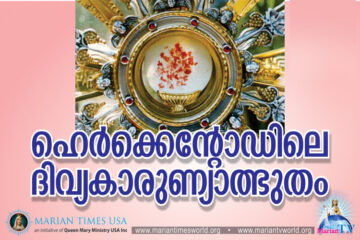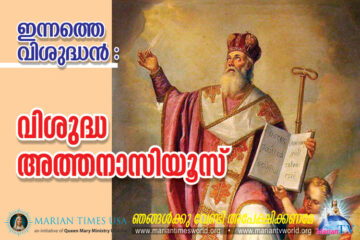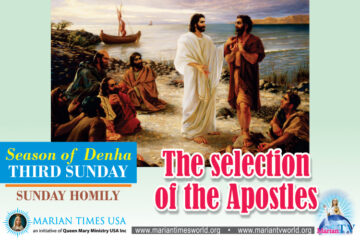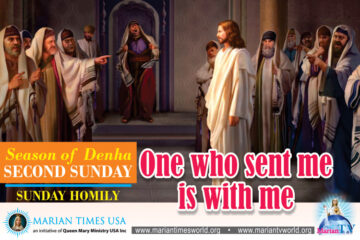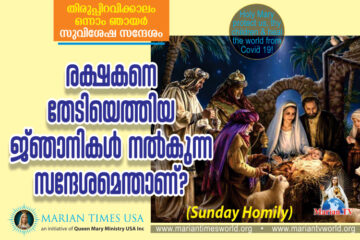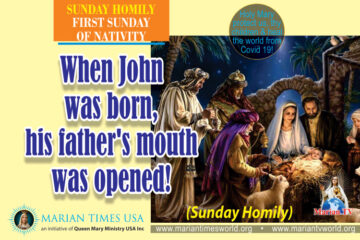THIRD SUNDAY OF ANNUNCIATION: HOMILY
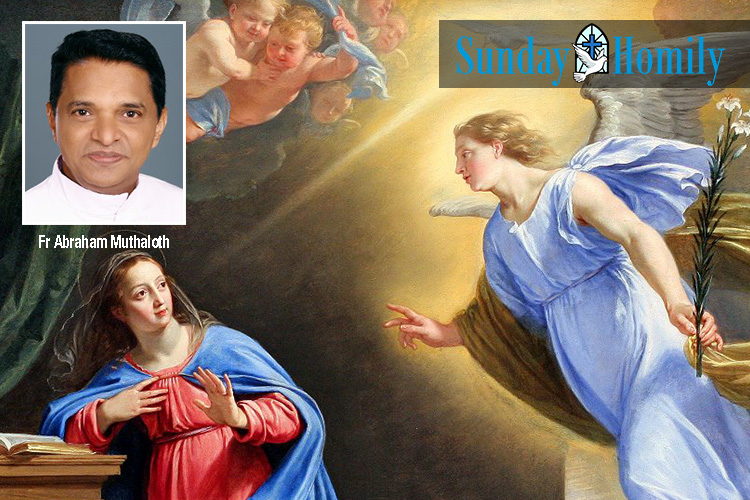
~ Fr. Abraham Mutholath, Chicago, USA. ~
Birth of John the Baptist.(Luke 1:57-66)
INTRODUCTION
The birth of John the Baptist was marking a new chapter in the salvation history. The neighbors and relatives who used to view Elizabeth as disgraceful, came to rejoice with her. Zechariah and Elizabeth did the circumcision of the child on the eighth day according to the Jewish tradition. Zechariah was relieved from his nine-month muteness when he obeyed the directive of Angel Gabriel by naming his child John. Hisinitialreaction when he regained the speech was blessing God.
Birth of John the Baptist.
(Luke 1:57-66)
Bible Text
(57) When the time arrived for Elizabeth to have her child she gave birth to a son. (58) Her neighbors and relatives heard that the Lord had shown his great mercy toward her, and they rejoiced with her.(59) When they came on the eighth day to circumcise the child, they were going to call him Zechariah after his father, (60) but his mother said in reply, “No. He will be called John.”(61) But they answered her, “There is no one among your relatives who has this name.” (62) So they made signs, asking his father what he wished him to be called. (63) He asked for a tablet and wrote, “John is his name,” and all were amazed. (64) Immediately his mouth was opened, his tongue freed, and he spoke blessing God.(65) Then fear came upon all their neighbors, and all these matters were discussed throughout the hill country of Judea. (66) All who heard these things took them to heart, saying, “What, then, will this child be?” For surely the hand of the Lord was with him.
Interpretation
(57) When the time arrived for Elizabeth to have her child she gave birth to a son.
Elizabeth’s conception of John was miraculous. When pregnant Mary visited Elizabeth, John was filled with theHoly Spirit while he was in the womb of his mother. However, his growth in the womb of Elizabeth and birth were quitenormal.
The church celebrates the birthday of John the Baptist on 24th of June,six months prior to Christmas. This birthday celebration of John is an exception because the date of death is celebrated in the case of other saints remembering their passage from world’s militant church to the triumphant church in heaven. The exception of celebrating the birthday of John in the liturgical calendar of the church is because he was filled with the Holy Spirit while he was in the womb of his mother. (Luke 1:15, 1:40-44).
(58) Her neighbors and relatives heard that the Lord had shown his great mercy toward her, and they rejoiced with her.
The birth of this child at the old age of parents with extraordinary sign of dumbness and deafness of his father Zechariah was a great reason for the neighbors to gather at the birth of the child and to rejoice with his aged mother Elizabeth. Formerly they were under the impression that God was punishing them because Elizabeth was barren.This rejoice of neighbors was a fulfillment of Angel Gabriel’s promise to Zechariah: “you will have joy and gladness, and many will rejoice at his birth.” (Luke 1:14). They came again on the eighth day for the child’s circumcision.
(59) When they came on the eighth day to circumcise the child, they were going to call him Zechariah after his father,
Circumcision was a symbol of covenant between God and Abraham. The act of circumcision was called the bris, which means “covenant.” According to the God’s covenant with Abraham, “Throughout the ages, every male among you, when he is eight days old, shall be circumcised, including house born slaves and those acquired with money from any foreigner who is not of your descendants.” (Gen 17:12). So, the practice of circumcision was continued from the time of Abraham among the Jews and it was a sign of covenant relationship with God.
Place of circumcision
Here the pronoun “they” stands for the priests and relatives who were assigned to perform the circumcision. The circumcision could be done either in a synagogue or at the house. In John’s case, it was performed at the house is clear from the fact that Elizabeth was present at the occasion. According to the Law of the Lord given through Moses, the mother was unclean for 40 days if she gave birth to a boy and 80 days if the born child was a girl. During that time “she shall not touch anything sacred nor enter the sanctuary till the days of her purification are fulfilled.” (Lev. 12:1-5). So, the performers and participants of circumcision came to the house of Zechariah and Elizabeth on the eighth day.
Number eight, according to the Biblical numerology stands for recreation. God completed creation of the universe including a day of rest in seven days. So eighth day means a new beginning. The covenant with Abraham through circumcision was also a new beginning of salvation. So circumcision, that signals the beginning of the child’s covenant with God and initiation into Israel, was supposed to be performed on the eighth day. The importance of the eighth day is clear from that fact that even if the eighth day was a Sabbath when work was prohibited, circumcision was performed on that day as an exception.
The selection of eighth day for circumcision regardless of Sabbath observance was the decision from God. One reason is that the newborn baby will live a complete week inclusive of a Sabbath. Hence the baby experiences the “holiness” of a Sabbath. Then he can enter into the covenant with God and thus join the community of the Jewish people.
Another reason, based on recent medical science, is that the eighth day after birth is the best day for blood clotting and so is the suitable time for circumcision. Blood clotting is dependent on platelets, prothrombin, and vitamin K. Vitamin K and prothrombin levels are at their peak on the eighth day. Therefore, that day is physically the perfect day to perform circumcision which was unknown to humans until recently but known to omniscient God.
Naming of a male child was done near the birth or at the time of circumcision on the eighth day. Girls could be named anytime within 30 days of their birth. According to the Jewish practice, the name of the grandfather, and in exceptional cases that of the father,was given to the male child. Father’s name was given when there was uncertainty on the continuation of his name in the future generation. The priest and relatives might have considered to give Zechariah’s name to his child because Zechariah’s name could not be assured of transmitting to the next generationas John was his only son.
A person’s name had great significance in the in Biblical times. It was given based on the essence of the person, divine role in his birth, his birth order, his character, his future mission, his physical trait, where he was born and so on. For example, Adam means man, human being, or red (color of the earth) (Gen. 2:7), Noah means rest or comfort (Gen. 5:29),Abraham means father of a multitude (Gen. 17:5), Moses means drawn out of the waters (Ex. 2:10), David means beloved(1 Sam. 13:14) and Jesus means savior or Jehovah is salvation (Mat. 1:21).
(60) but his mother said in reply, “No. He will be called John.”
In the Biblical tradition, either the mother or the father could name their children. For example: Leah and Rachel named their children and their maidservants’ children (Gen. 29:31-30:24). Hanna named her son Samuel (1 Samuel 1:20). Abram named his son from Hagar, Ishmael. (Gen. 16:15). Moses named his son Gershom (Exodus 2:22). There were exceptions when others also named children: Pharaoh’s daughter named her adopted son Moses. (Exodus 2:10). Naomi’s female neighbors named her son Obed. (Ruth 4:17).
Since Zechariah could not talk, the priests and relatives asked Elizabeth to name her son. She knew that the child had a God given name, John. She got this information since she was filled with Holy Spirit during the visit of Blessed Virgin Mary or Zachariah might have communicated to her in writing.
(61) But they answered her, “There is no one among your relatives who has this name.”
In John’s case the earthly custom was not followed because he was specially chosen by God. God had assigned him a name making him God’s own chosen one for a special mission. John belonged to God more than Zechariah’s family.
(62) So they made signs, asking his father what he wished him to be called.
Naming a child was mainly the right of the father. Since John was deaf and dumb, they did not ask him first. However, the priests and relatives doubted whether Elizabeth was mistaken. That waswhy they asked Zechariah. However, they had to use sign language because he could not hear them.
(63) He asked for a tablet and wrote, “John is his name,” and all were amazed.
Zechariah could not communicate the name by sign language. So he asked for a tablet. The tablet was a wooden piece with wax coating. A stick like stylus was used to write. Instead of writing, “his name shall be,” Zechariah uses, “John is his name” closing any chance of discussion on the matter. God had revealed that name to him through Angel Gabriel.
Rachel had named her second son as Benoni at her deathbed. However, Jacob, the child’s father, renamed him Benjamin. (Gen. 35:18). In John’s case, both Elizabeth and Zechariah independently gave the same name because God had revealed that name to them.
John is the shorter version of Jehohanan, which means “Yahweh’s gift” or “God is gracious.” So here the name signifies that the child was a gracious gift of God to his parents at an advanced age of his mother.
(64) Immediately his mouth was opened, his tongue freed, and he spoke blessing God.
When Zechariah obeyed the command of God by naming the child John, he was relieved from his nine months of muteness which also became a proof of divine intervention for the people around. His first reaction after the recovery was “blessing God.”
(65) Then fear came upon all their neighbors, and all these matters were discussed throughout the hill country of Judea.
This fear was the “fear of God.” Biblical meaning of fear of God is “reverence to God respecting Him, obeying Him, submitting to His discipline, and worshipping Him in awe.” The faith of the people who witnessed the events had increased. They began to share their experience all over the hill country of Judea. So even from the time of birth, John began to become popular.
(66) All who heard these things took them to heart, saying, “What, then, will this child be?” For surely the hand of the Lord was with him.
“Hand of the Lord” is symbolic of the wonderful power, providence, care, grace and favor of God manifested through the chosen onces. So in John’s case, the hand of God formed him a great prophet, the foretold return of Elijah, who came to prepare the way for the Lord (Malachi 3: 23-24 / 4:5-6).
When people found the hand of the Lord in the life of John, they were wondering what would be the future of him. When the hand of the Lord is with us, we become instruments of God, and God will do wonders with our efforts.
Message:
Rejoice with Others
When Zechariah and Elizabeth had a child, their neighbors and relatives came to rejoice with her. Similarly, when we notice the blessings and achievements of others we need to rejoice and praise God with them.
Birth and Baptism
God creates and shapes a child in the womb of its mother. Birth is the child’s entry into the world and physical separation from the mother. The child inherits good and bad from the parents and other ancestors. That is why the genetic history is checked for physical health, character, morality, and spirituality. We are spiritually born dead and not eligible for heaven until we are baptized in the church. Baptism is our spiritual birth as Jesus told to Nicodemus (John 3:1-21). So in the spiritual sense, our baptismal date is more important and supposed to be more joyful than the date of birth. In fact, some Christians celebrate their annual baptismal day rather than their annual birthday.
Day of Baptism
Circumcision was the continuation of the covenant God made with Abraham, the father of faith. In the New Testament baptism replaces circumcision. Based on the Jewish and Catholic tradition, baptism is to be performed within a few weeks after the birth of the child. According to the Canon Law, “Parents are obliged to take care that infants are baptized in the first few weeks; as soon as possible after the birth or even before it, they are to go to the pastor to request the sacrament for their child and to be prepared properly for it.” (Can. 867 §1). However, many parents nowpostpone baptism of their children to a later dateto have it along with the annual birthday celebration of the child or along with some other family function. This is not in tune with the directive of the Church. Children born of Catholic parents have the right to receive the sacraments of Initiation to be free from original sin and to be a citizen of God’s kingdom as soon as possible after their birth. Parents shall not delay this God given privilege of children.
Naming a child
The current trend of giving fancy names without any meaning or Biblical significance is to be discontinued. Canon law states, “Parents, sponsors, and the pastor are to take care that a name foreign to Christian sensibility is not given.” (Can. 855). We have to respect the Jewish-Christian tradition of giving first-name according to the names of grandparents for both male and female children in the family. However, many young parents give fancy names as the first names for their children and include the grandparents’ names as middle names. The first name shall be the name of the grandparent and middle name the name of the father and last name that of the family.
Teach children to study and learn from their patron saint
It is encouraging that in many parishes children use the costumes of their patron saints on the All Saints Day. This is to be encouraged and continued. Celebrating the feast day of patron saint of children, guiding them to learn more about them, and encouraging to seek the intercession of the patron saint will also help the spiritual formation of the children.
Faith formation of children
Children are not private property of parents. God and nation have right over them. They are to be trained according to the laws of God and of the nation. Infantbaptism is administered on condition that the parents and godparents take the responsibility to train the baptized child according to the teaching of the church and according to the traditions of the particular church. So parents shall bring their children to their own particular church for religious education training and faith formation through regular attendance of liturgical services and participation in pious associations.


